- Home
- Ian Mcewan
Machines Like Me Page 7
Machines Like Me Read online
Page 7
Where the pavement narrowed between a tree and a garden wall, I saw how he stood aside to let a woman with a pushchair through.
As we neared the shop he said, somewhat absurdly, ‘It’s good to get out.’
Simon Syed had grown up in a large village thirty miles north of Calcutta. His English teacher at his school had been an Anglophile, a martinet who had beaten into his pupils a courteous and precise English. I had never asked Simon how or why he had taken on a Christian forename. Perhaps a desire to integrate, or the parting insistence of his formidable teacher. He had arrived in north Clapham from Calcutta in his late teens and immediately went to work in his uncle’s shop. Thirty years later, the uncle had died and the shop passed to the nephew, who still supported his aunt from the proceeds. He also supported a wife and three grown-up children, but he didn’t like to talk about them. He was a Muslim, by culture rather than practice. If there was sadness in his life, it was well concealed behind a dignified manner. Now in his mid-sixties, he was sleek, bald, very correct, with a small moustache that tapered to sharp points. There was an anthropology journal, not available on the Internet, that he kept for me. He didn’t mind when I came in to scan the world’s front pages during the Task Force days. He was amused by my taste for low-grade chocolate – those global brands invented between two world wars. In the mid-afternoons, after hours at my screen, I craved sugar.
In that strange way by which one reserves intimacies for a mere acquaintance, I had told Simon about my new girlfriend. When she and I had been in the shop together, he had seen for himself.
Now, whenever I came by, his first question was always, ‘How are matters proceeding?’ He liked to tell me, on the basis of nothing but kindness, ‘It’s clear. Her fate is you. No dodging it! Eternal happiness for you both.’ I sensed that many disappointments were heaped behind him. He was old enough to be my father and wanted for me what had eluded him.
There were no other customers when Adam and I entered the cramped shop with its compound scent of newsprint, peanut dust and cheap toiletries. Simon rose from the wooden chair he sat on behind the till. Because I was not alone, he would not be asking the usual question.
I made the introduction. ‘Simon. My friend Adam.’
Simon nodded. Adam said, ‘Hello,’ and smiled.
I was reassured. A good start. If Simon had noticed the strange appearance of Adam’s eyes, he didn’t show it. It was a common reaction, I would soon discover. People assumed a congenital deformity and politely looked away. Simon and I discussed the cricket – three consecutive sixes and a pitch invasion at the India–England T20 – while Adam stood apart before an array of canned goods on a shelf. They would be instantly familiar to him, their commercial histories, market share, nutritional value. But as we chatted, it was obvious he wasn’t looking at tins of peas, or anything at all. His face was frozen. He hadn’t moved in two minutes. I worried that something unusual or unpleasant was about to happen. Simon politely pretended he hadn’t noticed. It was possible that Adam had put himself in rest mode. I made a mental note: he was in need of an appearance of plausibility whenever doing nothing. His eyes were open, but he failed to blink. Perhaps I had brought him out into the world too soon. Simon would be offended that I had tried to pass off Adam as a person, a friend. It could look like mockery, a tasteless joke. I would have betrayed a pleasant acquaintance.
The cricket banter began to falter. Simon’s gaze settled on Adam, then returned to me. He said tactfully, ‘Your Anthropos is in.’
It was my prompt to go over to the magazines, where Adam stood. Years ago, Simon had cleared his top shelf of soft porn in favour of specialist stuff, literary magazines, academic bulletins of international relations, history, entomology. A fair number of ageing, down-at-heel intellectuals lived in the neighbourhood.
As I turned away he added, ‘You can get it yourself?’ A gentle tease to lower the tension. Simon was taller and he usually reached up for me.
A single word brought Adam to life. With the faintest whirring sound, which I hoped only I could hear, he turned to address Simon in formal terms. ‘Your self, you say. There’s a coincidence. I’ve been giving some thought lately to the mystery of the self. Some say it’s an organic element or process embedded in neural structures. Others insist that it’s an illusion, a by-product of our narrative tendencies.’
There was a silence then, stiffening a little, Simon said, ‘Well, sir, which is it? What have you decided?’
‘It’s the way I’m made. I’m bound to conclude that I’ve a very powerful sense of self and I’m certain that it’s real and that neuroscience will describe it fully one day. Even when it does, I won’t know this self any better than I do now. But I do have moments of doubt when I wonder whether I’m subject to a form of Cartesian error.’
By this time I had the journal in my hands and was preparing to leave. ‘Take the Buddhists,’ Simon said. ‘They prefer to get along without a self.’
‘Indeed. I’d like to meet one. Do you know any?’
Simon was emphatic. ‘No, sir. Absolutely, I do not.’
I raised a hand in farewell and thanks and, taking Adam by his elbow, guided him towards the door.
*
It was a cliché of romantic love, but no less painful for that: the stronger my feelings, the more remote and unattainable Miranda appeared. How could I complain when she was attained that very first night, after dinner? We had fun, we talked easily, we ate and slept together most nights. But I was greedy for more, though I tried not to show it. I wanted her to open up to me, to want me, need me, show some hunger for me, some delight in me. Instead, my initial impression held – she could take me or leave me. Everything good that passed between us – sex, food, movies, new plays – was instigated by me. Without me she drifted in silence towards her default condition upstairs, to a book on the Corn Laws, a bowl of cereal, a cup of weak herbal tea, curled up in an armchair, barefoot and oblivious. Sometimes, she sat for long periods without a book. If I put my head round her door (we now had keys to each other’s places) and said, ‘How about an hour of frantic sex?’ she would say calmly, ‘OK,’ and we would go into her or my bedroom and she would rise splendidly to her pleasures and mine. When we were done she would take a shower and return to her chair. Unless I suggested something else. A glass of wine, a risotto, an almost famous sax player at a Stockwell pub. OK again.
To everything I proposed, indoors or out, she brought the same tranquil readiness. Happy to hold my hand. But there was something, or many things, I didn’t understand, or she didn’t want me to know about. Whenever she had a seminar or needed to use the library, she returned from college in the late afternoons. Once a week, she came back later. It took me a while to notice that it was always a Friday. Finally she told me that she went to the Regent’s Park Mosque for Friday prayers. That surprised me. But no, she wasn’t thinking of converting from atheism. She had in mind a social-history paper she might write. I wasn’t convinced, but I let it go.
What we lacked was conversational intimacy. We were closest when we argued about the Task Force. When we went to a bar, her conversation was general. She was happy with her solitude or with lively chat about public matters, but there was nothing personal in between, except her father’s health or his literary career. When I tried to ease us towards the past, perhaps angling in gently with something about myself or a question about her own history, she reached quickly for generalities or an account of the earliest years of her childhood, or an anecdote about someone she knew. I told her about my idiotic excursion into tax fraud, my experience of court and the tedium of my hours of community service. I would have told her anyway, but the story was my pretext to ask if she herself had ever been in court. The answer was abrupt. Never! And then she changed the subject. I’d been in various promising affairs and in love, or almost in love, two or three times before, depending on definitions. I fancied myself an expert and knew better than to put her under pressure. I still thought I might get m
ore out of Adam on the Salisbury affair. If I didn’t know her secret, at least she didn’t know I knew she had one. Tact was everything. I still hadn’t told her that I loved her, or divulged my fantasies about our shared future or even hinted at my frustration. I left her alone with her books or her thoughts whenever it suited her. Though the subject was not in the line of my interests, I worked up an acquaintance with the Corn Laws and developed some ideas of my own about free trade. She didn’t dismiss them, but nor was she impressed.
So here we were upstairs at dinner in her kitchen, which was even smaller than mine. The table was of white moulded plastic, just big enough for two, probably stolen from a pub garden by a previous tenant. Standing at the sink, up to his elbows in suds, Adam dealt with the plates and cutlery we’d handed him at the end of our meal – toad-in-the-hole, baked beans, fried eggs. Student food. On the windowsill, where yellow gingham curtains hung still in our late-summer heat wave, a radio was playing the Beatles, recently regrouped after twelve years apart. Their album, Love and Lemons, had been derided for its grandiosity, for failing to resist the lure and overreach of an eighty-strong symphony orchestra. They could not master such forces, was the general drift, with half a lifetime’s store of guitar chords. Nor did we wish to be told again, the Times critic complained, that love was all we needed, even if it were true, which it was not.
But I liked the music’s muscular sentimentality, emptied of irony by these middle-aged performers, so confident and tuneful, liberated by useful ignorance of two and a half centuries of symphonic experimentation. Lennon’s rasping voice floated towards us from some faraway echoing place beyond the horizon, or the grave. I didn’t mind being told again about love. Here before me were all of its warm possibilities, barely three feet away, and it was all I needed. Here was her long, exquisitely shaped face (those angled cheekbones might break through the skin one day), the amused gaze, at this point still merry, and narrowed, locked on me, the lips parted, for she was about to speak against what I’d just said. Her perfect elongated nose flared faintly at the base of the nostrils’ arch to signal in advance her dissent. Her pallor set off her fine brown hair, tonight childishly parted dead centre. Against prevailing fashion, she kept out of the sun. Her bare white arms were also thin and unblemished – not a single freckle.
From my point of view we still holidayed in the foothills, among possibilities whose fulfilment rose like distant alps. I tried to ignore them in order to attend to details. From her perspective, on the other side of this frail table, we may have already reached our highest point. She may have thought she was as close as she ever wanted to be, or could be, to another person. Love stories like Jane Austen’s used to conclude chastely with preparations for a wedding. Now their climax lay on the far side of carnal knowledge, where all of complexity waited.
For now, my business was to conduct a political argument with her without feelings running high then turning sour, and at the same time stay true to myself and let her do the same. It was a feasible balancing act, as long as I drank less than half a bottle of the indifferent Médoc that stood between us. We’d had this conversation before and it should have been easier now, but repetition seemed like an indictment of us both. We didn’t really want to be talking about it. Impossible to avoid, even though we knew it would lead nowhere. But this was how it was for everyone. We were all still tending the wound. How could Miranda and I spend our lives together when we couldn’t agree on such a fundamental as war?
About the islands formerly known as the Falklands she had firm views. She insisted that the Argentine flag-planting on remote South Georgia had been a clear violation of international law. I said it was an inhospitable place and no one should be asked to fight to the death for it. She said that the taking of Port Stanley was the desperate act of an unpopular regime looking to whip up patriotic fervour. I said this was all the more reason not to get drawn in. She said the Task Force was a brave and brilliant conception, even in failure. I said, uneasily remembering my emotional state when the ships set off, that it was a ridiculous enactment of lost imperial grandeur. How could I not see, she said, that this was an anti-fascist war? No (I spoke over her) it was a row over property, fed on each side by nationalistic stupidity. I summoned the Borges observation: two bald men fighting over a comb. She replied that a bald man might hand down his comb to his children. I was struggling to understand this when she added that the generals had tortured, disappeared and killed their citizens by the thousands and were running the economy into the ground. If we’d taken back the islands, the humiliation would have finished the military regime and democracy would have returned to Argentina. I replied that she could not possibly know this. We had lost thousands of young men and women to the cause of Mrs Thatcher’s ambitions. My voice began to rise before I remembered. I resumed quietly but with a certain tremor: that she remained in office after such slaughter was the greatest political scandal of our time. I delivered this with a finality that deserved a moment’s respectful silence, but Miranda came straight back to tell me that the prime minister failed in a decent cause and was supported by almost all of Parliament and the country and she was right to remain in office.
During this conversation, Adam finished with the dishes and stood with his back to the kitchen sink to watch us, arms folded, his head turning from side to side, speaker to speaker, like a spectator at a tennis match. Our exchange was not exactly weary, but repetition had given it an air of ritual. Like facing armies, we’d taken up our positions and intended to hold them. Miranda was telling me that the Task Force set off without proper ship-to-air missiles. The chiefs of staff let the armed forces down. I used to hear terms like these – ship-to-air, homing devices, titanium-tipped – at the Warwickshire student union bar, but only from men, men of the political left, whose opinions were complicated by tacit admiration for the weapon systems they condemned. In her soft and fluent delivery, she mingled these with other concepts from the lexicon of established power – the open society, rule of law, restoration of democracy. Perhaps it was her father I was hearing.
While she was speaking, I turned to catch Adam’s expression. What I saw was his devoted attention. More than that. A look of delight. He adored what she was saying. I turned back to Miranda as she reminded me that the Falklanders were my fellow citizens, now living under fascism. Was I happy with that? I disliked this rhetorical turn. It was a masked insult. The conversation was turning sour, just as I’d feared, but I couldn’t help myself. In the tiny kitchen space, I was hot and irritable as I reached for the wine and filled my glass. There could have been a negotiated settlement, I started to say. A slow and painless thirty-year transition, a UN mandate, guaranteed rights. She interrupted to inform me that we could never trust any undertaking by the murdering generals. As she said it, I saw them in caricature, in braided hats, campaign ribbons, cavalry boots, and Galtieri on his white horse in a confetti blizzard on the Avenida 25 de Mayo.
I said that I accepted every last one of her arguments. The forces set off on their 8,000-mile mission, her risky strategy was tested and it failed. Thousands she never knew or cared about were drowned or burned to death, or live on, maimed, disfigured, traumatised. We’ve arrived at the worst outcome: the junta possessed the island and its inhabitants. Whereas a policy of slow, negotiated agreement wasn’t tested, but if it had failed we would have reached the same outcome, without the agony and death. We couldn’t know. What might have happened was lost to us. So what was there to argue about?
I saw that the glass I’d filled, and had no memory of touching, was empty. And I was wrong. There was plenty to argue about, for even as I said it, I knew I was crossing a line. I had accused her of not caring about the dead, and she was angry.
Her eyes were narrowed, without merriment, but she didn’t address my transgression. Instead she turned to Adam and asked quietly, ‘What’s your view?’
His gaze travelled from her to me and back. I still didn’t know whether he actually saw anything. An image
on some internal screen that no one was watching, or some diffused circuitry to orient his body in three-dimensional space? Seeming to see could be a blind trick of imitation, a social manoeuvre to fool us into projecting onto him a human quality. But I couldn’t help it: when our eyes briefly met and I looked into the blue irises flecked with spears of black, the moment appeared rich with meaning, with anticipation. I wanted to know whether he understood, as I did, and as Miranda surely did, that the issue here was loyalty.
His tone was prompt and calm. ‘Invasion, success or failure. Negotiated settlement, success or failure. Four outcomes or effects. Without benefit of hindsight, we’d have to choose which causes to pursue, which to avoid. We’d be in the realm of Bayesian inverse probability. We’d be looking for the probable cause of an effect rather than the most likely effect of a cause. Only sensible, to try and find a formal representation of our guesswork. Our reference point, our datum, would be an observer of the Falklands situation before any decisions were taken. Certain a priori probability values are ascribed to the four outcomes. As fresh information comes in, we can measure relative changes in probability. But we can’t possess an absolute value. It may help us to define the weight of new evidence logarithmically, so that, assuming a base ten—’
‘Adam. Enough! Really. What nonsense!’ Now it was Miranda who reached for the Médoc.
I was relieved to be no longer the object of her irritation. I said, ‘But Miranda and I would ascribe completely different a priori values.’

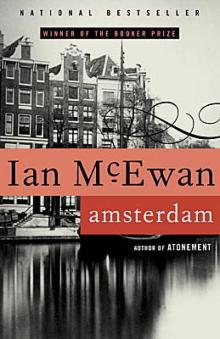 Amsterdam
Amsterdam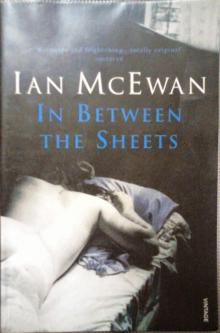 In Between the Sheets
In Between the Sheets Atonement
Atonement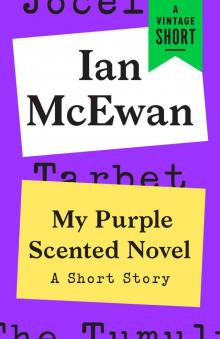 My Purple Scented Novel
My Purple Scented Novel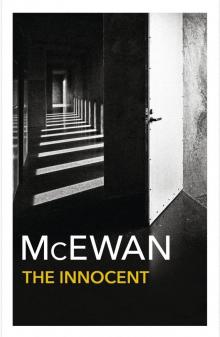 The Innocent
The Innocent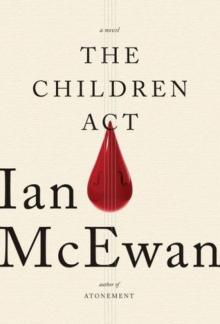 The Children Act
The Children Act Enduring Love
Enduring Love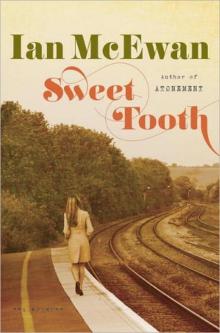 Sweet Tooth
Sweet Tooth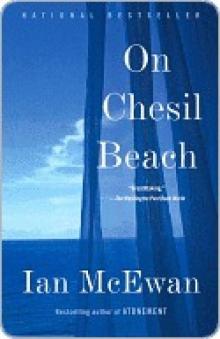 On Chesil Beach
On Chesil Beach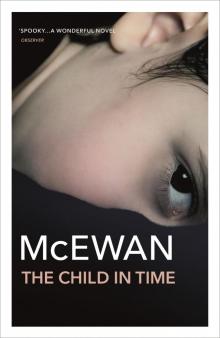 The Child in Time
The Child in Time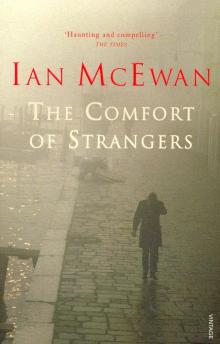 The Comfort of Strangers
The Comfort of Strangers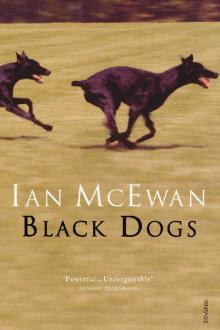 Black Dogs
Black Dogs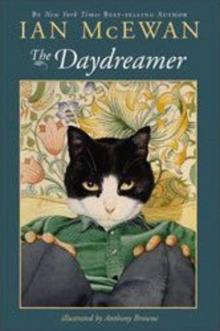 The Daydreamer
The Daydreamer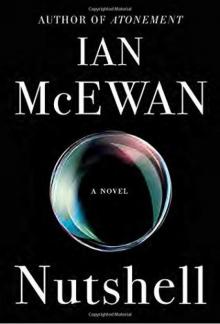 Nutshell
Nutshell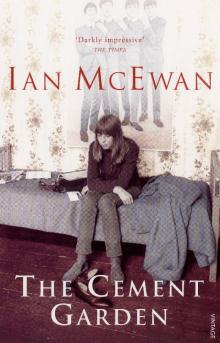 The Cement Garden
The Cement Garden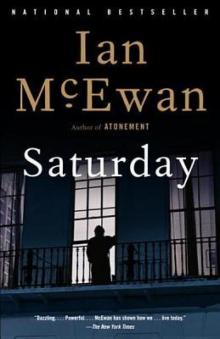 Saturday
Saturday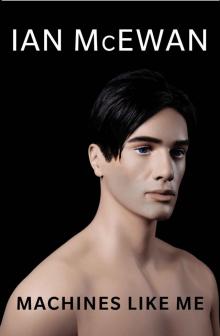 Machines Like Me
Machines Like Me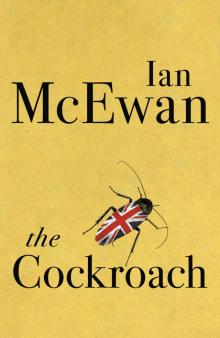 The Cockroach
The Cockroach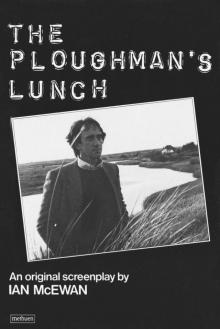 The Ploughman’s Lunch
The Ploughman’s Lunch